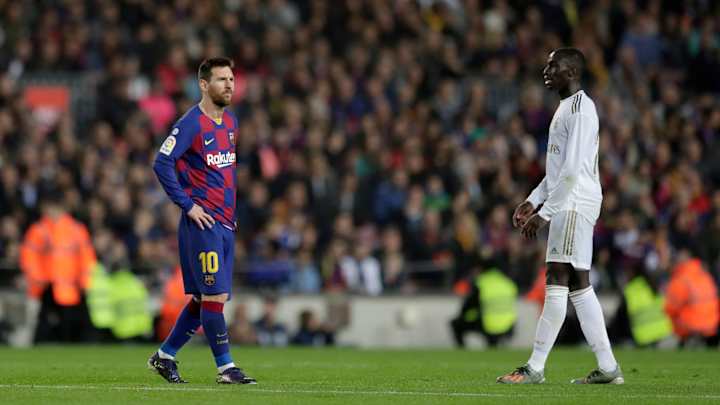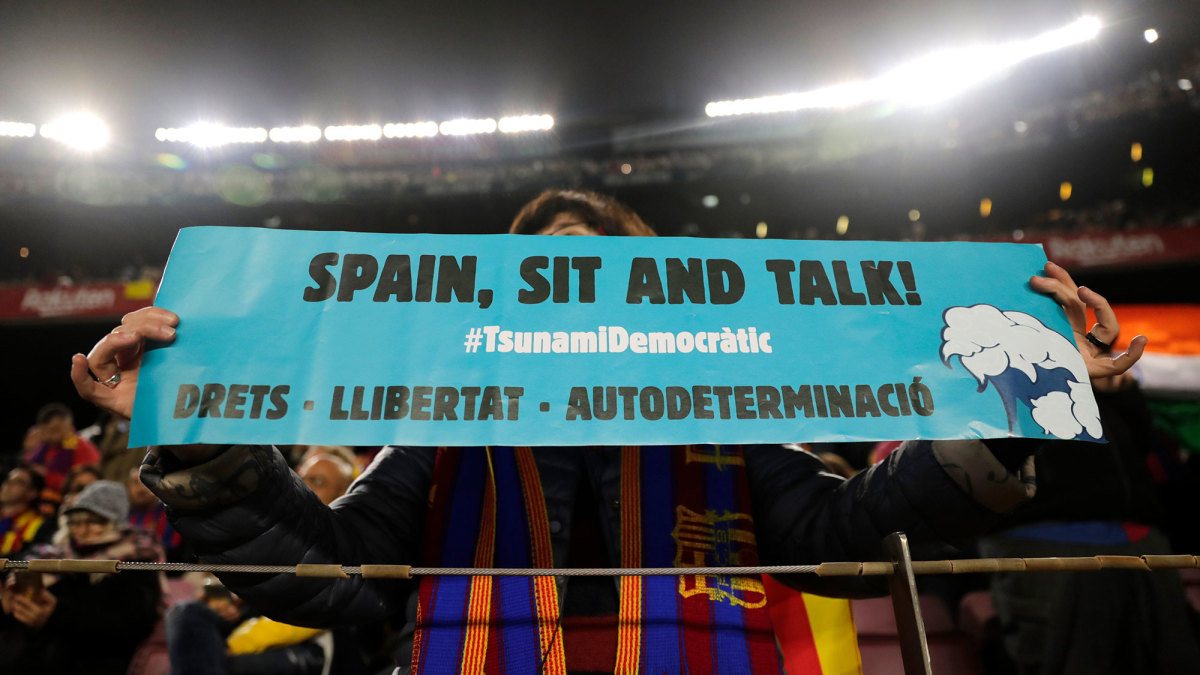Barcelona, Real Madrid Continue Struggling to Find Top Form in Protest-Tinted Clasico

The only people who were satisfied by the outcome of the first Clasico of the season were likely the authorities. A fixture fraught with political tension and the potential for protests and disruption passed off as peacefully as could have been expected–at least inside Camp Nou.
The game itself, though, was frenetic and untidy. Real Madrid had the better of the first half and Barcelona the better of the second, but with both struggling for rhythm and precision, the result was the first goalless league Clasico since 2002.
The game had initially been scheduled for October 26, before being rearranged because of the protests that followed the imprisonment of nine Catalan nationalist leaders. Security around the ground was tight, to the point that the two teams stayed at the same hotel and traveled to the match together. To that extent, this was as much a political occasion as it was a sporting one.
A number of banners urging the Spanish government to “sit down and talk” made it through security into the stadium, and dozens of yellow balls were released as Arturo Vidal was introduced 12 minutes into the second half, but there was no serious disorder inside the stadium. Outside of it, protesters and riot police clashed, with trash cans set on fire, according to local reports.
Even in the footballing sphere there was unease. This was the first Clasico since 2014 not to feature the reigning European champion.

Although the two teams entered sharing first place in La Liga, neither has been anywhere near its best this season. Madrid is improving–the classic pattern of a season under Zinedine Zidane–and while this is nothing like the squad he would like, he is at least beginning the process of shaping the midfield. It remains, though, a work in progress.
Isco, for instance, seemed to have been frozen out until a month ago, when he was unexpectedly given a starting berth against Paris Saint-Germain. He has been excellent since and was Madrid’s best creative player again on Wednesday.
There is a fundamental fragility to Barcelona’s midfield that allowed Madrid to dominate for periods, slinging in cross after cross and then pressing hard as Marc-Andre ter Stegen inevitably cleared short, winning the ball back high and maintaining the pressure. This is the Barcelona that keeps being overwhelmed in Europe, soft-centered and prone to being intimidated. It took a clearance off the line from Gerard Pique to prevent Karim Benzema from putting Madrid ahead after 17 minutes, and although there were few other clear chances before halftime, there was a definite sense that Madrid had the better of the first half.
But where there is Lionel Messi there is always a threat–even if the doubt grows month by month that his increasingly minimalist approach to the game and his reluctance to get involved with the defensive side of the game are partly why Barcelona so often looks unbalanced.
He, too, had a shot cleared off the line, by Sergio Ramos, after reacting sharpest when Thibaut Courtois fisted away a cross from Jordi Alba. Messi, though, was guilty of a remarkable miss just before the hour, mis-kicking when just eight yards out as Antoine Griezmann squared to him (although Griezmann appeared to handle the ball in the build up, so VAR may have ruled a goal out anyway).
It’s difficult to tell with somebody who plays the game at the level he does, but there is perhaps just a sense that Messi is not quite at his stratospheric best at the moment. He never has the most positive body language, but emerging from the tunnel at halftime there was a distinct sense of weariness about Messi.

Still, Barcelona was much improved after the break, particularly once Vidal had replaced Nelson Semedo. But it was never so good that Madrid was clinging on, and by the end the game had settled into a tired grapple. There have been questions about Barcelona’s fitness this season, and it was easy here to understand why.
These remain two very good sides, but neither is anything like what it was at its peak. Barcelona, by a slight edge in goal-difference, remains top of the table, but this was a result that perhaps enhanced Madrid’s chances of lifting the league title. And the biggest concern, perhaps, is that even when the two giants are so far from what they could be, there is still no other side really ready to step up and challenge them. The years when Spanish football was the best in Europe, though, are perhaps drawing to a close.
